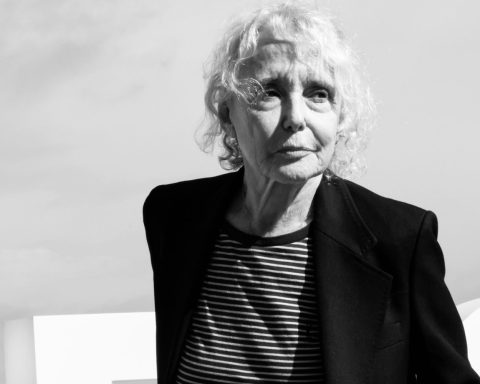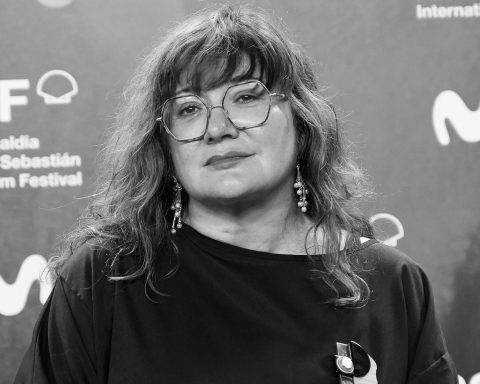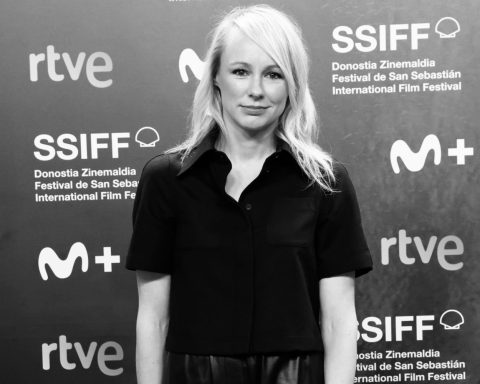Trine Dyrholm was born in Odense, Denmark on 15 April 1972. She received national attention when she placed third in the Danish “Dansk Melodi Grand Prix” as a fourteen year-old singer. At eighteen, she gained again national recognition when she won the Bodil Award for Best Actress in her debut film, the teenage romance, “Springflod”. Dyrholm has won the Bodil for Best Actress four more times, among which the one for her performance in the thriller “Haevnen” by Susanne Bier that won the Oscar for Best Foreign Language Film at the 83rd Academy Awards, and a Bodil Award for Best Supporting Actress, as well as eight Robert Awards in her acting career.
Tara Karajica caught up with her at this year’s Berlin International Film Festival and talks to her about her new film, “The Commune”, that screened in Competition at the festival, as well as her TV show “The Legacy” and her upcoming films and women, among many other things.
How did you get involved in The Commune and how did you prepare for your role?
Trine Dyrholm: I’ve worked with Thomas Vinterberg before – twenty years ago. And, when he called me, I was so excited that we would work again. Then, he presented the script to me. It wasn’t finished at all. The story was there, of course. But, you know, I like to be involved and I like to be cooperative and he actually allows that. So, we discussed the script and the character and then we did some things. I prepared. I did some research, talked to some people living in communes. And, I talked to a journalist that is well-known in Denmark. At that time, she was very famous – she still is – and she is, like my character, a news reporter. And, she also lived in a commune. Then, of course, the most important thing is to talk with the director and to agree on the character, in a way. We did some rehearsals with the Commune cast. I cast the daughter. I was there, at the last casting, and improvised with her. And then, we had a dinner with the whole Commune crew where we were supposed to meet in costumes and improvise. So, that helped a lot as well, in terms of how to interact with the other characters. When we shoot, I like to set it all free. And, especially if we’re doing emotional scenes, I like to just see what happens. I like to be curious about my character. How will she react here? Instead of being good as an actress I want not to know what will happen. It’s another way of jumping into it.
And, how much did you know about communes before the film?
T.D.: I have friends that are brought up this way. I’ve lived in a commune for half a year in the 80s with my cousin. She lived there for many years. Of course, the 80s was another time and it was not as radical as this one. But, I know about it. I’ve never tried it like that. I come from a family that is pretty open and with a lot of social life. And, I also did demonstrations with my mom against atomic bombs and for freedom and peace. I was a little involved in the hippie community as well, but not in a radical way.
You’re the biggest female star now in Denmark.
T.D.: I’ve been so privileged, I have to say, to have had so many good parts. And, I’ve also cooperated with directors and invented some of the characters together with them.
Like what?
T.D.: Like, for instance, in Soap, that was here, and in Little Soldier that was here as well. I’ve worked together with directors again many times and we have a language together and they are also my friends. Then, we talk about interests, new films, and we discuss and then suddenly, you know, we go: “Oh! This is an interesting character”. What I’m saying is that I am lucky. In Denmark, I have a lot of awards and stuff, but that’s also because I had a lot of opportunities, if you understand what I mean. I got many good parts.
And, you’ve got a series now.
T.D.: Yes, it’s called The Legacy and we’re doing the third season now. I’m actually going to direct two episodes.
Is it the first time?
T.D.: Yes, it’s the first time.
Are you excited?
T.D.: I’m so excited! It’s a big challenge. But, I have been very involved since the first season, in the script room – not writing, I can’t write at all – discussing things and not only my own character but the whole thing. And, I was also involved with the art department. For me, it’s really a big chance.
Is there something you would steal from Thomas Vinterberg, directing-wise?
T.D.: Well, if I could steal his way of doing it, I would do that. But, it’s such a personal thing. And, he is really a wonderful, wonderful man and a very talented director, I have to say. He’s very professional. He knows the métier. He is so good at making an environment on set that is so focused and open at the same time and that’s why it’s fun to work with him because he explores things and you just shoot over and over again. It’s exhausting but it’s interesting. It’s challenging. And, he does long shots, for instance – like thirteen pages. And, you just sit there and you have to break down twenty times a day or more. But, I like that. He’s demanding and I find that inspiring.
Your character’s husband leaves her for another younger woman in the film. How would you feel if that happened to you?
T.D.: I’m not married but I have a man. And, we have a child together. I’ve seen it many times so it’s not a new thing in life. It’s pretty common. But, of course, I would be pretty unhappy if that happened in my life. But, I think, in this case, it’s also a woman who is longing for something else. And, in the beginning, she’s uninspired by the traditional family life and she’s bored; she wants to explore life and she convinces him to move into this new construction and, in the end, she realizes, because of her daughter, that she has to find her own way. She has to move on herself, and I think it’s an interesting portrayal of a strong woman who becomes a victim of her own ideals. And, her emotional life takes over. It’s embarrassing that she cannot just go away or move or whatever. I’ve always liked characters who fail, who cannot find out how to do this. I mean, when I read the script, I was so afraid that she would be a victim in the wrong way. Hopefully, she’s not. I think she’s a victim of her own ideals and I think that it’s interesting to make a portrait of a strong woman who is so vulnerable and is doing the things that make us say: “Why don’t you just leave?” because that’s so true.
It’s almost like she’s persecuting herself by staying.
T.D.: Yeah! But, that also has to do with the period, of course. At that time, you were so old-fashioned if you didn’t allow free love. That’s also the story. But, if you just move the story to now, I think it’s still true in the sense that I’ve experienced myself, in love, that my emotional life took over and I couldn’t find myself in it. And, I was not very proud of that, I have to say, because you lose your dignity. And, I think that that is what happens here. And, that’s fun to play.
We just continue to make good parts for women and things like “after forty, it’s over” and stuff like that, I don’t believe in that anymore.
The argument around your character is the age issue. As an actress and as a woman, is it something you think about?
T.D.: You can always find somebody who has it worse. Well, of course I think about it because it actually happened some years ago when I played in two films: A Royal Affair and Love’s All You Need and suddenly I had grown-up children and I was like: “I can’t be the mom here!” I have a little child myself, you know, and I was used to play young girls or single girls and then suddenly these big children are here and I realized that it just changed. I am now the old generation and a new generation has come. I thought it was so inspiring, I have to say. Of course, I think about it. And, when I look at myself in the mirror sometimes, it’s like: “Oh! My God!” But, when I play, when I act, I never think about it. I think that vanity is your biggest enemy as an actress. I think part of being an actress, an actor, is to show the darkest sides of human emotions and that’s not necessarily a pretty sight. And, you have to not think about that when you act. Of course, when I was on the red carpet yesterday, I wanted to look like a real movie star. I was playing the character of a movie star and it’s fun! I have to say that I feel much better now than I did in the middle of my twenties and it’s just getting better. That’s what I’ve heard. The only thing is that we talk so much about beauty… You never know when life ends, that – I know. Because I lost some close people. And, at least, we can enjoy life and if we have to spend too much time with vanity, it’s a shame, I think. But, I have some good role models. I mean, Meryl Streep is here. She’s such a fantastic and inspiring actress. Helen Mirren…
… You were compared to her, actually. It was said that you were the Danish counterpart of Helen Mirren…
T.D.: Yeah! I’ve heard that! And, another woman that I admire so much, that is here as well, is Isabelle Huppert. So, I mean, there are good role models out there and I also want to be one. So, we just continue to make good parts for women and things like “after forty, it’s over” and stuff like that, I don’t believe in that anymore. I think there are some really great parts out there and it seems as if it is getting better and better.
Can you talk a little bit more about the other work that you’re doing?
T.D.: It’s actually a TV show that is about all the consequences from that period. It’s about a female artist who dies and then you follow her four children trying to cope with everything after that. Jesper Christensen is playing my dad and he’s really great. He actually directed two episodes in the first season and three episodes in the second season.
So, you’re both directing?
T.D.: That’s the thing with this show. It started out with Pernilla August. She conceptualized it. So, it turned out like this. It’s written by a female writer called Maya Ilsøe.
Is there a film you’ve made you Michael Nyqvist?
T.D.: Yes, Du forsvinder. It’s called You Disappear. It’s a book about new brain science. It’s actually about a couple where the man got a brain tumor and changed personality. And, the book is very well-known in Denmark and also in other countries. It has a lot of science in it. It’s about free will and are we our brain? Do we have a self or not? It’s really interesting.
Speaking about important questions. Do you agree with what Thomas Vinterberg said during the press conference about the Danish and the fact that it was a shame how politicians are dealing with the refugees?
T.D.: I think we have some big problems all over the world now and we have to be really, really human. It’s a difficult time now and we have a very huge party – they’re not in the government but the government relies on it, it’s det Folkeparti, and it’s very right wing – and I find it very scary, I have to say. It’s growing fast. And, I think that’s why he mentioned it because it’s a big problem now. We have to solve all these big issues and if we are too frightened and too closed, then it can be difficult to solve these problems. We are one big world and we have to do it together. That’s the thing, we can’t just say: “You have to stay here, we have our country.” I know it’s complicated. I’m not naïve. But, we really have some big issues to solve and we have to be careful not to be too aggressive with each other, I believe.
Can we go back to the conversation about women? There’s a lot of talk about the place of women in the industry today: gender inequality, pay gap, lack of diversity… But, I feel that it is different in Denmark. It’s better for women. You have a lot of women directors; there are more opportunities…
T.D.: We have a lot of women directors, that’s right. And, I’ve worked with a lot of them. I’ve been lucky that way. But, for instance, last year, I have to say that in Denmark almost all the films were made by only men; films about a football team, four war films of soldiers, and not that many female parts, I have to say. There were some, of course. So, it depends.
So, do you look abroad much?
T.D.: No. But, I would love to work abroad if I can. I have an agent in London and here. Well, I think that we’re doing well, I have to say, in Denmark and especially, in television. We have all those female characters; huge female characters. And, as I said before, I’ve been so privileged to have good parts but you have to make an effort. You have to kind of co-create some of the things. You have to be involved. And, you cannot just sit and wait for it. We have to make it happen.
This interview was conducted at the 2016 Berlin International Film Festival.
Update: Trine Dyrholm won the Silver Bear for Best Actress at the festival.









